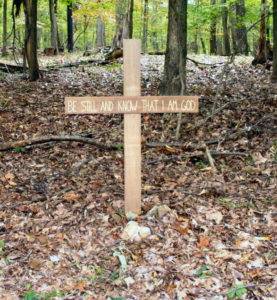by Muriel Lipp
 When I first came to The Church of the Saviour, one of the things that attracted me most was the holding of disciplines. If we claimed to be disciples, I thought, we should live in a disciplined fashion, and here was a church that took this seriously. We would attend worship regularly (not only when we felt like it), pray daily, go on silent retreat at least once a year, contribute proportionally, participate in missions to the poor, practice love in all our relationships, promote peace personally as well as globally.
When I first came to The Church of the Saviour, one of the things that attracted me most was the holding of disciplines. If we claimed to be disciples, I thought, we should live in a disciplined fashion, and here was a church that took this seriously. We would attend worship regularly (not only when we felt like it), pray daily, go on silent retreat at least once a year, contribute proportionally, participate in missions to the poor, practice love in all our relationships, promote peace personally as well as globally.
We soon learned that very few of us were faithful. We were hypocrites, saying one thing and doing another. Prayer, for many of us, seemed to be the big obstacle. How to communicate daily with someone as mysterious as God Almighty? I have found that the process, in itself, is the answer. Process is product, and the process, for me, is walking.
You know that medieval book, The Cloud of Unknowing, and the modern books by Thomas Keating, which are based on The Cloud? These speak of what we call Centering Prayer, or the one-word prayer. Another word for this kind of prayer is contemplation. It is accomplished in the heart, not the brain. As The Cloud says, “Not by study, but by grace.” Prayer is a very personal relationship between us and God, accomplished in personal ways.
Frank Laubach’s journal, Letters by a Modern Mystic, written when he was working among the Moros in the Philippines, says: “I have just returned from a walk alone, a walk so wonderful that I feel like reducing it to a universal rule, that all people ought to take a walk every evening all alone,…and that during this entire walk they ought to talk with God,…and let God do most of the talking.”
I, too, pray while I walk. This started after the death of our son. Consumed by grief, guilt and anger, I could not pray. So I took walks. Though I was angry with God, still I prayed, “God, God, God,” as I walked, just as the writer of The Cloud of Unknowing suggests. Soon this became my regular method of prayer. We lived by the Potomac then, so as I wept and walked, the water of my tears and the water of the river felt unifying. All around the river was death and decay, as well as life and rebirth: a new universe. As I prayed for myself and my own pain, I could not ignore those brothers and sisters around the world who suffered with me, whose moans and groans rose like incense on an altar.
Now, many years later, I am healed of my grief, but I still do my prayers while walking. Having practiced yoga for almost 25 years, I coordinate my breath with my strides, keeping both lateral sides of my body even. It looks like plain walking, and the praying is silent. My eyes and ears pick up much to distract me, but I name it all God; there are many thank-you-thank-you-thank-yous in these walks. When it is raining or snowing, I sacrifice my walking prayer to seek God at my desk by the window. God is in the raindrops, the snowflakes and inside me as I try to have a naked intent toward God.
In the Gospels, Jesus gives us little direction in methods of prayer, but he walked a lot so I like to think he prayed while walking. When I am walking, I practice centering prayer for half the distance and then begin intercession and petition. It is important to pray for family, mission group, my church and special persons God has given me. Thanksgiving is woven through it all. I am a person who loves nature, so I give thanks for every tree trunk, every flower, every buzzing thing. Others get the same thrill from city streets—the rich and the poor crowding through them. All of it can be woven into our prayers.
When Father Keating visited our community a few years ago, he used the word intend often, just as the author of The Cloud did many centuries before. Intend, intend, intend. The dictionary definition is “to stretch out for, to aim at.” I had been taught, “The road to hell is paved with good intentions,” but my walking prayer is teaching me something different. I am learning, in the words of the author of The Cloud, to “intend God altogether.” It is the fruit of my heart, a seed swelling to burst.
Muriel Lipp first joined The Church of the Saviour in the 1950s and is now a member of Seekers Church where a longer version of this was shared as a sermon.

